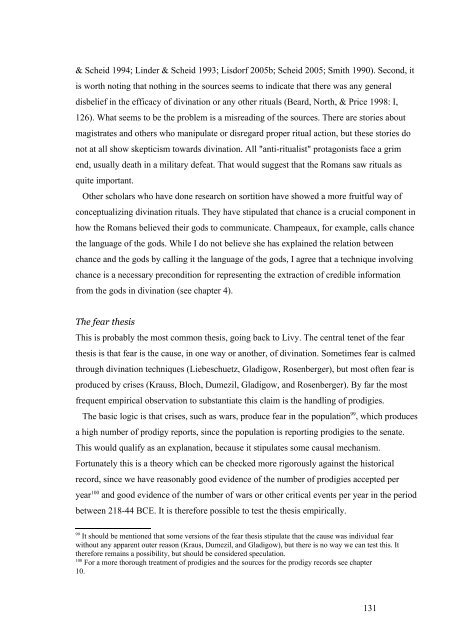The dissemination of divination in roman republican times
The dissemination of divination in roman republican times
The dissemination of divination in roman republican times
You also want an ePaper? Increase the reach of your titles
YUMPU automatically turns print PDFs into web optimized ePapers that Google loves.
& Scheid 1994; L<strong>in</strong>der & Scheid 1993; Lisdorf 2005b; Scheid 2005; Smith 1990). Second, it<br />
is worth not<strong>in</strong>g that noth<strong>in</strong>g <strong>in</strong> the sources seems to <strong>in</strong>dicate that there was any general<br />
disbelief <strong>in</strong> the efficacy <strong>of</strong> <strong>div<strong>in</strong>ation</strong> or any other rituals (Beard, North, & Price 1998: I,<br />
126). What seems to be the problem is a misread<strong>in</strong>g <strong>of</strong> the sources. <strong>The</strong>re are stories about<br />
magistrates and others who manipulate or disregard proper ritual action, but these stories do<br />
not at all show skepticism towards <strong>div<strong>in</strong>ation</strong>. All "anti-ritualist" protagonists face a grim<br />
end, usually death <strong>in</strong> a military defeat. That would suggest that the Romans saw rituals as<br />
quite important.<br />
Other scholars who have done research on sortition have showed a more fruitful way <strong>of</strong><br />
conceptualiz<strong>in</strong>g <strong>div<strong>in</strong>ation</strong> rituals. <strong>The</strong>y have stipulated that chance is a crucial component <strong>in</strong><br />
how the Romans believed their gods to communicate. Champeaux, for example, calls chance<br />
the language <strong>of</strong> the gods. While I do not believe she has expla<strong>in</strong>ed the relation between<br />
chance and the gods by call<strong>in</strong>g it the language <strong>of</strong> the gods, I agree that a technique <strong>in</strong>volv<strong>in</strong>g<br />
chance is a necessary precondition for represent<strong>in</strong>g the extraction <strong>of</strong> credible <strong>in</strong>formation<br />
from the gods <strong>in</strong> <strong>div<strong>in</strong>ation</strong> (see chapter 4).<br />
<strong>The</strong> fear thesis<br />
This is probably the most common thesis, go<strong>in</strong>g back to Livy. <strong>The</strong> central tenet <strong>of</strong> the fear<br />
thesis is that fear is the cause, <strong>in</strong> one way or another, <strong>of</strong> <strong>div<strong>in</strong>ation</strong>. Some<strong>times</strong> fear is calmed<br />
through <strong>div<strong>in</strong>ation</strong> techniques (Liebeschuetz, Gladigow, Rosenberger), but most <strong>of</strong>ten fear is<br />
produced by crises (Krauss, Bloch, Dumezil, Gladigow, and Rosenberger). By far the most<br />
frequent empirical observation to substantiate this claim is the handl<strong>in</strong>g <strong>of</strong> prodigies.<br />
<strong>The</strong> basic logic is that crises, such as wars, produce fear <strong>in</strong> the population 99 , which produces<br />
a high number <strong>of</strong> prodigy reports, s<strong>in</strong>ce the population is report<strong>in</strong>g prodigies to the senate.<br />
This would qualify as an explanation, because it stipulates some causal mechanism.<br />
Fortunately this is a theory which can be checked more rigorously aga<strong>in</strong>st the historical<br />
record, s<strong>in</strong>ce we have reasonably good evidence <strong>of</strong> the number <strong>of</strong> prodigies accepted per<br />
year 100 and good evidence <strong>of</strong> the number <strong>of</strong> wars or other critical events per year <strong>in</strong> the period<br />
between 218-44 BCE. It is therefore possible to test the thesis empirically.<br />
99 It should be mentioned that some versions <strong>of</strong> the fear thesis stipulate that the cause was <strong>in</strong>dividual fear<br />
without any apparent outer reason (Kraus, Dumezil, and Gladigow), but there is no way we can test this. It<br />
therefore rema<strong>in</strong>s a possibility, but should be considered speculation.<br />
100 For a more thorough treatment <strong>of</strong> prodigies and the sources for the prodigy records see chapter<br />
10.<br />
131


